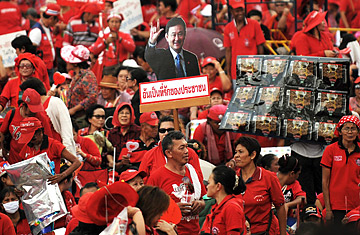
A Thai anti-government 'Red Shirt' protester carries a cut-out of exiled ex-premier Thaksin Shinawatra (C) during a rally at Democracy Monument in downtown Bangkok on March 12, 2011.
They descended on Bangkok, more than 100,000 strong, demanding that Prime Minister Abhisit Vejjajiva resign and hold new elections. Known as the Red Shirts for the color of their clothing, they occupied key sections of the capital for nine weeks before the army cleared the streets. In the end, 91 people were killed, more than 1,400 injured and some Red Shirts burned down more 30 buildings as they fled Bangkok. But the government remained in power. Now, almost exactly a year to the day that the protest began, P.M. Abhisit announced he will dissolve parliament in May, paving the way for a national election that was a key Red Shirt demand.
But it's anything but certain that an election will succeed in healing Thailand's deep political and social divisions. "An election is a good first step, but the divisions are so deep now that it will take more time," says Professor Ukrist Pathmanand, a political scientist at Chulalongkorn University in Bangkok. "People on both sides have to realize they can't get everything they want. And the key to the situation is whether the military will be able to accept the next government."
Many Red Shirts still long for the return of former Prime Minister Thaksin Shinawatra, who was ousted in a 2006 military coup and fled Thailand after being convicted of corruption. A political party aligned with the Red Shirts, the Puea Thai party, has already said it will campaign on bringing Thaksin back. Other Red Shirts, however, do not support Thaksin but want the military's influence over politics ended. Relatively dormant politically for more than a decade, as political divisions and violence increased during the past five years, the role of the military has steadily grown.
On Saturday March 12, the anniversary of the start of last year's protest, tens of thousands of Red Shirts gathered at key points around Bangkok and marched on the Democracy Monument, a concrete sculpture in the heart of the capital's old quarter that was the scene of some of the worst violence in 2010. The demonstrators chanted "people died here" and waved banners that denounced past military coups. Many called for Abhisit to be put on trial. Some wore Thaksin T-shirts. The prospect of an election did nothing to dull their fervor to demonstrate, and many said they would keep protesting in the streets whenever their leaders call for it. Several Red Shirt leaders have said they will contest the election under the Puea Thai banner, and the protests are starting to serve as a campaigning tool.
Meanwhile, a rival group of protesters, called the Yellow Shirts for their chosen color, have been staging their own anti-government demonstration outside the Prime Minister's office for several weeks, angry over Abhisit's failure to use military force against neighboring Cambodia in a border dispute. And thousands of farmers and other rural people unhappy about dams, the price of rice and other grievances have been camped out near the parliament building demanding the government address their problems.
Ukrist says demonstrations are normally a sign of a healthy democracy, but not at the present time in Thailand. He says: "Demonstrations are direct democracy, or people power," he says. "But these groups have leaders who are manipulating the people for their own power agendas." The result, Ukrist believes, will be more confrontation.
Abhisit has tried to placate each group, but his moves have fallen short. A Truth and Reconciliation Committee composed of non-government figures he appointed has failed to provide measures that satisfy the Red Shirts or other groups. Investigations into who was responsible for the various deaths and injuries during the protests have produced few concrete results and have been tainted by allegations of non-cooperation and interference by the military.
Opposition to Abhisit is strong in the northeastern and northern parts of Thailand, while Bangkok and the south generally vote in favor of his Democrat Party. Red Shirts generally view Abhisit as a representative of a Bangkok-based elite that does not care about or understand their problems. For Abhisit to win, he will most likely have to rely on a strong performance by a coalition partner, the Bhumjai Thai party, to draw votes away from the Red-backed Puea Thai party in the northeast.
Should the Puea Thai party win, however, that could set up another confrontation with the military if party members attempt to overturn Thaksin's convictions and allow him to return. While using Thaksin in its campaign is a good political move, Ukrist says Puea Thai will need to have a different agenda once in power should it wish to co-exist with the military. "They will need to focus on providing justice to all people," he says, "not simply ruling for the interests of one particular person or group." Right now, however, few politicians seem to be putting Thailand's wider interests above their own.
